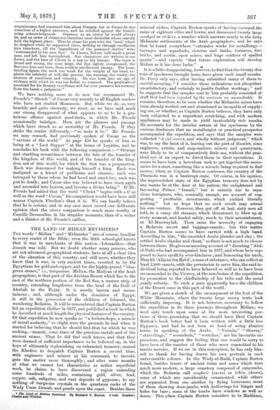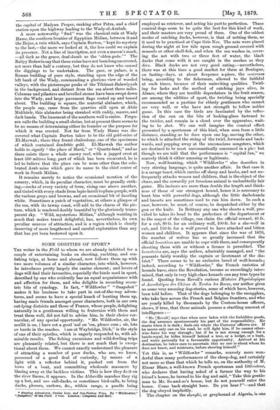THE LAND OF MIDIAN REVISITED.* THE words " Midian" and
" Midiamtes " are, of course, familiar to every reader of the Bible ; even the little school-girl knows that it was to merchants of this nation—Ishmaelites—that Joseph was sold. But we doubt whether many persons, who are not advanced geographical students, have at all a clear idea of the situation of this country, and still more, whether they know that it was, in very ancient times, resorted to by the Egyptians for gold and copper, and for the highly-prized " blue- green stones," i.e., turquoises. Midian, the Madyan of the Arab geographers, is that part of the Arabian Desert which lies to the east of the northern portion of the Red Sea, a narrow strip of country, extending lengthwise from the head of the Gulf of Akabah to the Hejaz. It is mostly barren and moun- tainous ; and, although under the dominion of Egypt, is still in the possession of the children of Ishmael, the wandering Bedawin. It will be remembered that Captain Burton led an expedition thither in 1877, and published a book in which he described at much length the physical features of the country. Of that expedition he now speaks as " a forlorn-hope, a miracle of moral audacity," so slight were the grounds he had when it started for believing that he should find that for which he was seeking,—namely, some trace of the precious metals and of the ancient mines. That he did find such traces, and that they were deemed of sufficient importance to be followed up, in the hope of ultimately replenishing an exhausted treasury, caused the Khedive to despatch Captain Burton a second time, with engineers and miners at his command, to investi- gate the matter more thoroughly ; and after some months of what we cannot but characterise as rather superficial work, he claims to have discovered a region extending some hundreds of miles, containing gold, silver, lead, copper, salt, saltpetre, and vast deposits of gypsum; to say nothing of turquoise crystals in the quartzose rocks of the Wady Umm Jirmah, and pearls upon the coast. Besides these
• The Land of Radian Bociatat. By Richard F. Burton. I vols. London: Chatto and Ns/Indus.
mineral riches, Captain Burton speaks of having surveyed the ruins of eighteen cities and towns, and discovered twenty large inashgal or ateliers, a number which answers nearly to the forty
Midianite settlements of the Arab geographers, and he says that he found everywhere " extensive works for metallurgy— barrages and aqueducts, cisterns and tanks, furnaces, fire7 bricks, and scoriae, open mines, and huge scatters of spelled quartz"—and expects "that future exploration will develop Midian as it has done India."
It is a little disappointing, however, to find that the twenty-five tons of specimens brought home have given such small results.
Dr. Percy only says, after having submitted many of them to careful assaying, " I consider these indications not altogether unsatisfactory, and certainly to justify further working; " and he suggests that the samples sent to him probably consisted of stuff that had been rejected by the ancients as ureworkable. It remains, therefore, to be seen whether the Midianite mines have- been already worked out and abandoned as incapable of supply- ing ore, or whether, as Captain Burton believes, they have only been subjected to a superficial scratching, and with modern appliances may be made to yield incalculably rich results..
He accounts for the inferior nature of the specimens by the curious disclosure that no metallurgist or practical prospector
accompanied the expedition, and says that the samples were collected " d ciel ouvert, and wholly without judgment," which was, to say the least of it, leaving out the part of Hamlet, since engineers, artists, and map-makers, miners and quarrymen, were likely to be of comparatively little use, without the prac- tised eye of an expert to direct them in their operations. It seems to have been a herculean task to get together the neces- saries for a start, something like a miracle being required to find money, when, as Captain Burton confesses, the country of the Pharaohs was in a bankrupt state. Of course, in his opinion, the impoverished state of the Egyptian treasury does not by any means lie at the door of his patron, the enlightened and far-seeing Prince " Ismail," but is entirely due to rapa- cious foreigners, who, comically enough, are accused of sug- gesting " profitable investments, which yielded literally nothing." Let us hope that no such result may attend his own venture. However, they got off at last, sixty men all told, in a crazy old steamer, which threatened to blow up at every moment, and landed safely, much to their astonishment, at El-Muowaylah. Then came the necessity of engaging a Bedawin escort and baggage-camels ; but this matter Captain Burton seems to have carried with a high hand_ According to him, " the unsettled Arabs plunder and slay ; the settled Arabs slander and cheat," so there is not much to choose between them. He gives an amusing account of " disrating " Abd- el-Nabi, who had accompanied him in 1877, andwhom he is sup- posed to have spoilt by over-kindness ; and honouring his uncle,.
Shaykh ibn Rabie, a man of substance, who can collect at least 2,000 camels, with the permission to serve him, the said in- dividual being reported to have behaved so well as to have been recommended to the Viceroy, at the conclusion of the expedition, for promotion to the chieftainship of his tribe and the usual yearly subsidy. To such a pass apparently have the children of the Desert come in this part of the world.
We are given a sketch of the encampment at the foot of the White Mountain, where the twenty large snowy tents look sufficiently imposing. It is not, however, necessary to follow the expedition in its three journeys throughout Midian; we need only touch upon some of the more interesting por- tions of them, premising that we should have liked Captain Burton's book better had it been written with a little less flippancy, and had he not been so fond of using abusive- terms in speaking of the Arabs. " Vermin," " thieves," " starvelings," " scoundrels," " wretches," are his favourite ex- pressions, and suggest the feeling that one would be sorry to have been of the number of those who were committed to his tender mercies. If we err in this conception, he has only him- self to thank for having drawn his own portrait in such unfavourable colours. In the Wady-el-Bala, Captain Burton found, besides traces of ancient ruins and some which were mach more modern, a large cemetery composed of catacombs, which the Bedawin call Inaghair (caves) or biban (doors), some of which are considerably ornamented, while others are separated from one another by flying buttresses, most of them showing door-jambs, with .hollowings for hinges and holes for bars ; some of the tombs have windows as well as doors. This place Captain Burton considers to be Madiftma„ the capital of Madyan Proper, ranking after Petra, and a chief station upon the highway leading to the Wady-el-Arabah.
A more noteworthy " find" was the classical ruin at Wady Hamz, the southern frontier of Egyptian Midian, between it and the Hejaz, a ruin which, says Captain Burton, " kept its mystery to the last,—the more we looked at it, the less could we explain its presence. Not a line of inscription, not even a mason's mark, —all dark as the grave, deaf-dumb as the ` olden gods." The Baliyy Bedawin say that these ruins have not been long uncovered, not more than half a century, but they do not know who caused the diggings to be undertaken. The gasr, or palace, is a Roman building of pure style, standing upon the edge of the left bank of the Wady, commanding a glorious view of wooded valleys, with the picturesque peaks of the Tihtimat-Balawiyyah in the background, and distant from the sea about three miles. Columns and pilasters and bevelled stones have been swept down into the Wady, and large pavement flags rooted up and tossed about. The building is square, the material alabaster, which, the people say, came from the quarries still open at Alnir Makhiu-ir, this alabaster being streaked with ruddy, mauve, and dark bands. The basement of the southern wall is entire. Fergu- son calls the building a small shrine, but at present there seems to be no means of determining either its founder or the purpose for which it was erected. Not far from Wady Hamz was dis- covered what Captain Burton takes to be the old gold-mine of El-Marwah ; there they found chalcedony, one of the specimens
It remains merely to notice the occasional mention of the scenery, which, in its peculiar character, must be grandly strik- ing,—rocks of every variety of form, rising one above another, and tinted with every shade from lapis-lazuli to plum-purple, with the various greys and browns, and an occasional bit of dazzling white. Sometimes a patch of vegetation, at others a glimpse of the sea, with its tawny coast, will add to the charm of the pic- ture, which is rendered doubly beautiful by the gloriously trans- parent sky. " Wild, mysterious Midian," although wanting in much that makes travel delightful, has, nevertheless, its own peculiar sources of attraction, and is a region which is clearly deserving of more lengthened and careful exploration than any that has yet been bestowed upon it.



































 Previous page
Previous page